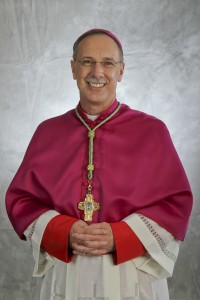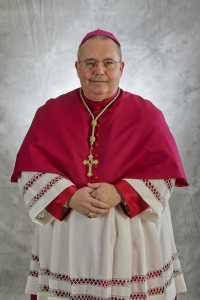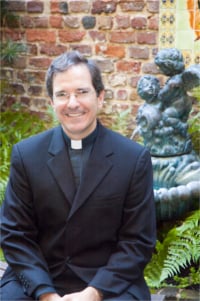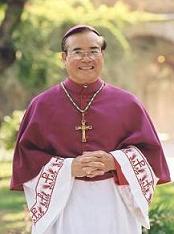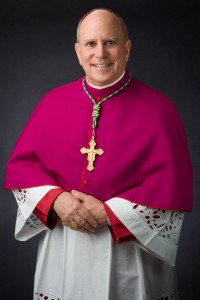 Welcome back to “The Clergy Speaks”, a recurring feature here at The Catholic Book Blogger. “The Clergy Speaks” is a column focusing on one question I have asked various members of the clergy. That question is: What five books would you recommend as must-reads for Catholics today? I left the responses open to current or classic books with the only restriction being that the Bible and the Catechism could not be used as they are a given. This week we welcome Archbishop Samuel J. Aquila from the Archdiocese of Denver.
Welcome back to “The Clergy Speaks”, a recurring feature here at The Catholic Book Blogger. “The Clergy Speaks” is a column focusing on one question I have asked various members of the clergy. That question is: What five books would you recommend as must-reads for Catholics today? I left the responses open to current or classic books with the only restriction being that the Bible and the Catechism could not be used as they are a given. This week we welcome Archbishop Samuel J. Aquila from the Archdiocese of Denver.
Most Reverend Samuel J. Aquila was named the Archbishop of Denver on May 29, 2012 by Pope Benedict XVI.
For his episcopal motto Archbishop Aquila has chosen, “Do whatever he tells you” (Jn. 2:5). His ministry as shepherd of the people of northern Colorado is dedicated to helping every person experience the love of the Father, Son and Holy Spirit and be moved by that encounter to a lasting commitment to share the Gospel with enthusiasm, creativity and joy.
Archbishop Aquila was born on September 24, 1950, in Burbank, Calif. He was ordained to the priesthood in Denver on June 5, 1976, and served the Denver Archdiocese for 25 years before being appointed Coadjutor Bishop of Fargo, N.D. on June 12, 2001. On March 18, 2002, he became bishop of Fargo upon the retirement of Bishop James Sullivan. He was installed as the eighth Archbishop of Denver on July 18, 2012.
Here are his picks for 5 must read books:
This list of Catholic must-reads admittedly covers a wide variety of topics. My aim in compiling it was to help Catholics and others acquire a familiarity with both the rich history of the Church and her contemporary face. I hope that it helps in some small way to lead others to a more intimate relationship with the Holy Trinity.
The Spirit of the Liturgy , by Romano Guardini
This book is essential reading for any Catholic who wants to understand the source and summit of our faith, the Holy Eucharist. Fr. Guardini reveals the beauty and hidden treasures of the liturgy by seeking to understand it for what it is, a prayer addressed to the Father, inspired and guided by the Holy Spirit.
Forming Intentional Disciples, by Sherry Weddell
Sherry Weddell ably captures the struggles of modern Catholic parishes and does so in a way that people can understand. Even more crucially, she explains that stemming the tide of people leaving the Church means cultivating “intentional disciples” who are willing to leave everything and follow Christ in his Church through participation in the sacramental life of the Church.
The Confessions, by St. Augustine of Hippo
This classic work by St. Augustine should be a part of every Catholic’s library. He speaks from the heart about his encounter with God and Jesus Christ, which will touch the reader’s heart. He takes the reader through the important stages of conversion that can be observed in our own lives, while at the same time providing spiritual lights to guide the reader to Christ and his Church.
Jesus of Nazareth Vol. 1, Vol. 2
, Vol. 3
, by Pope Benedict XVI
With this three-volume set, Pope Benedict guides the reader through the life of Christ, drawing on his extensive knowledge of Scripture and his own reflections. This series vividly portrays Jesus and the historical events that gave birth to the Church.
Evangelii Gaudium, by Pope Francis
I know that a number of bishops have recommended Pope Francis’ encyclical, “The Joy of the Gospel,” and I must agree with their selection. Both the pastoral personality of Pope Francis and the essential Gospel kerygma find their expression in this unique work. Underpinning all of this is his invitation to desire the joy of Jesus Christ.
The Encyclicals of Pope Saint John Paul II
I realize that this is not one but many books, but you have asked me to do the impossible in naming only five titles. The beauty and importance of St. John Paul II’s encyclicals is that they cover topics that are of concern to society today – from the relationship of faith and reason to bioethical issues – and do so within the framework of a true, Christian understanding of what it means to be human beings who are made in God’s image and likeness. He answers the fundamental question, “What is the purpose of my life.”
The Father’s Tale, by Michael O’Brien
Michael O’Brien is one of my favorite novelists because of his ability to convey spiritual struggles, truths and modern realities in his works. “The Father’s Tale” stands out for me because of its focus on the father figure, not only that of the main character, but also our heavenly Father. Rediscovering the Father, Son and Holy Spirit and forming an intimate relationship with each of the three persons of the Trinity is a key part of a mature spiritual life, and this book opens a path for dialogue on the importance of fatherhood.


